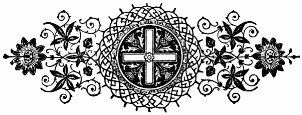
Saints Zachary and Elizabeth
|

Saints Zachary and Elizabeth![]() November 5th
November 5th ![]()
Saints Zachary and Elizabeth were the parents of St. John the Baptist. Zachary was a priest of the Old Covenant, and his wife was of the family of Aaron: both were "well approved in God's sight, following all the commandments and observances of the law without reproach". They were without children, and perhaps beyond the normal age of generation, when Zachary, while officiating in the Temple, had a vision of an angel, who told him that in response to their prayers they should have a son, " to whom thou shalt give the name John", who should be filled with the Holy Ghost even in his mother's womb, and who should bring back many of the sons of Israel to the Lord their God.
The coming to pass of these things and their circumstances; the visit of our Lady to her kinswoman Elizabeth, when she too was filled with the Holy Ghost and greeted Mary as blessed among women; Mary's hymn of praise, "My soul doth magnify the Lord"; after John's birth the return of speech, of which he had been deprived, to Zachary's lips, so that he spoke in prophecy, "Blessed be the Lord, the God of Israel, who hath visited and redeemed his people": these things are all set out in the first chapter of St. Luke's Gospel. After that nothing more is heard of Zachary and his wife. But it is common opinion among the fathers, e.g. Epiphanius, Basil, Cyril of Alexandria, that St. Zachary died a martyr, and according to an apocryphal writing he was killed in the Temple, "between the porch and the altar", by command of Herod because he refused to disclose the whereabouts of his son. But the Roman Martyrology makes no mention of martyrdom when it name Zachary and Elizabeth on November 5, the day on which their feast is kept in Palestine. St. Zachary is named in the commemoration of the saints at Mass according to the Mozarabic rite.
As has been said, all that is known about SS. Zachary and Elizabeth is to be found in St. Luke's Gospel, chap. i., and it was St. Peter Damian's opinion that to inquire about these things the evangelists did not choose to tell us shows an improper and superfluous curiosity (in his third sermon on the birth of our Lady). But those who disagree with him may refer also to Bardenhewer's Biblische Studien, vi, 187 (1901) and the various biblical dictionaries and encyclopaedias.
Butler's Lives of The Saints, Herbert J. Thurston, S.J. and Donald Attwater
Nihil Obstat: PATRICIVS MORRIS, S.T.D., L.S.S., CENSOR DEPVTATVS.
Imprimatur: E. MORROGH BERNARD, VICARIVS GENERALIS
WESTMONASTERII: DIE XXIII FEBRVARII MCMLIII
|
|